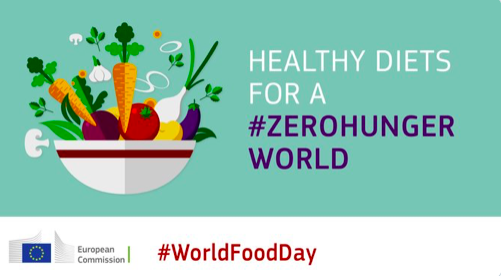Today is World Food Day, and the Food and Agriculture Organization of the United Nations has been promoting a video that states: “Over 820 million people suffer from hunger.”[1]
This has been the reality for many in Scotland. This year’s Scottish Health Survey revealed that, within the last 12 months, 1 in 4 single parents worried about running out of food.[2]Usdaw, the fifth largest trade union in the UK, recently reported that half of the 10,500 people surveyed – all of whom were employed – had missed meals to pay essential bills; 1 in 10 used food banks to feed their families.[3]
Our models of food production, distribution and supply are increasingly large scale and industrialised. In fact, the focus on increasing production has been the dominant narrative since the nineteenth century. In the context of hunger and scarcity, this push to produce more appears a logical one.
But this is only part of the picture.
The full quote from the FAO video states:
“Over 820 million people suffer from hunger. Even more are overweight and obese.” [4]
Worldwide, obesity has nearly tripled since 1975; in 2016, 39% of adults across the world were overweight.[5] In Scotland, 65% of adults are overweight and obesity levels in Scotland are among the highest of the OECD countries.[6]
Latest statistics also show that we are producing almost twice as much sheep meat as we consume in Scotland, whilst consuming only 2/3rds of the beef that we produce.[7]The world currently produces more food per head of population than ever before in human history. Scottish households waste over 600,000 tonnes of food – worth around £1 billion – each year.[8]
In this context, the narrative of scarcity does not hold up. And neither does the incessant drive to increase production.
Where does this leave us? Our understanding of the issues facing our food system has grown more sophisticated; now, more than ever, we appreciate that increased production comes at an environmental and social cost – and, due to mechanisation and industrialisation, fewer and fewer people are enjoying the economic benefit. We know that food production is one of the biggest contributors to biodiversity loss and climate change. Accounting for a quarter of all greenhouse gas emissions, food production is second only to transport in terms of climate change contribution.[9]
The push for increased production is not only outdated and ineffectual but actively harmful.

This World Food Day, let’s remember that Sustainable Development Goal 2 of #ZeroHunger goes beyond hunger– and shifts the narrative towards making healthy diets available to everyone, everywhere. Our goals should reflect our knowledge of the current situation. The more we understand and appreciate the connections between food production, health, climate change, poverty and workers’ rights – the better equipped we are to deal with the problems we face. We can and must do better. We aspire to a future where everyone has access to food that is nutritious, and produced with care for the workers and our environment – a future where everyone’s right to food is realised.
[1]http://www.fao.org/world-food-day
[2]Scottish Government (2019). Scottish health survey 2018: volume one – main report. Available online: https://www.gov.scot/binaries/content/documents/govscot/publications/statistics/2019/09/scottish-health-survey-2018-volume-1-main-report/documents/scottish-health-survey-2018-edition-volume-1-main-report/scottish-health-survey-2018-edition-volume-1-main-report/govscot%3Adocument/scottish-health-survey-2018-edition-volume-1-main-report.pdf
[3]Usdaw (2018). Time for better pay report. Available online: https://www.usdaw.org.uk/CMSPages/GetFile.aspx?guid=bbf6ba75-63af-4d9e-b255-79b53947ce98
[4]http://www.fao.org/world-food-day
[5]Scottish Government (2019). Scottish health survey 2018: volume one – main report. Available online: https://www.gov.scot/binaries/content/documents/govscot/publications/statistics/2019/09/scottish-health-survey-2018-volume-1-main-report/documents/scottish-health-survey-2018-edition-volume-1-main-report/scottish-health-survey-2018-edition-volume-1-main-report/govscot%3Adocument/scottish-health-survey-2018-edition-volume-1-main-report.pdf
[6]Scottish Government (2019). Scottish health survey 2018: volume one – main report. Available online: https://www.gov.scot/binaries/content/documents/govscot/publications/statistics/2019/09/scottish-health-survey-2018-volume-1-main-report/documents/scottish-health-survey-2018-edition-volume-1-main-report/scottish-health-survey-2018-edition-volume-1-main-report/govscot%3Adocument/scottish-health-survey-2018-edition-volume-1-main-report.pdf
[7]https://www.qmscotland.co.uk/sites/default/files/scottish_red_meat_industry_profile_2018_edition.pdf
[8]https://www.gov.scot/publications/food-waste-reduction-action-plan/pages/4/
[9]Scottish Government (2019). Scottish Greenhouse Gas Emissions 2017. Online. Available from: https://www.gov.scot/publications/scottish-greenhouse-gas-emissions-2017/